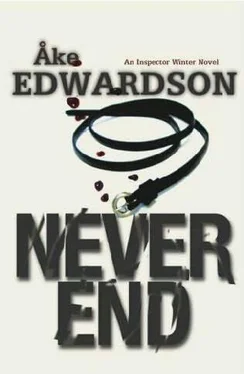There was nobody there by the timeWinter arrived. He could see the opening between the trees, and the rock, and the twigs and bushes at the sides, and the patches of dusky sky-but no shadow.
The grotto was empty.
The grass outside was bone dry again. There was no point in searching for footprints. But he ought to call somebody who could search for any new objects that might have appeared there. You never knew. You just never knew.
He circled around the clearing, then hurried onto the path behind and followed it for fifty meters. He went back again, and there was Angela with Elsa in her stroller, and she was staring wide-eyed at him as he ducked underneath a sapling.
"If you're going to play hide-and-seek with us, the least you can do is to tell us before you run off," Angela said. "Or maybe you want to hide and then go seeking yourself?"
He brushed a few pine needles off his shoulders and reached for the packet of cigarillos that was no longer in his big, wide breast pocket.
"Now's the time to give up," said Angela, who had seen what had happened.
Winter contemplated the packet on the ground, and bent down. Several of the cigarillos had fallen out and were lying in a semicircle. He walked over to it, picked up the packet, and then the cigarillos one by one-then he noticed a button lying next to the last one. Just a button, white or bony white, a shirt button.
***
They would have found it if it had been there when they first cordoned the place off after the murder of Angelika. And after the rape of Jeanette.
Since then, anybody at all could have walked past and lost a button.
"Do you have a tissue?" he asked, turning to Angela. He was still squatting.
Angela produced a Kleenex out of her handbag. Winter took it and wrapped it around the button.
"What is it?"
"A button."
"You don't say."
"A shirt button," said Winter. "I think."
"Oh, yes? Well, now we've seen how you go about your business," said Angela, turning to Elsa. "This is how detectives work, Elsa. Look and learn."
"Do you want Elsa to grow up to be an investigator?" said Winter, crouching down again, this time by the stroller. Elsa made a sound. "She said detective," Winter said.
"No. She said perspective." Angela looked at him with a smile. "I think she means that you've got to put your job in perspective." She looked toward the bushes. "Is this the way it's got to be when we go for a walk in the evening?"
"I thought I saw somebody," said Winter.
"Oh, for God's sake!"
"It's more complicated than you think."
"You can say that again."
"There was somebody standing there. It wasn't just your ordinary… passerby."
"Don't forget the button, Erik." She'd seen his eyes glaze over. It had turned cold among the trees. Elsa was trying to clamber out of the stroller. He helped her. "Sorry, Erik. I know it's important… and serious. Awful. But I couldn't resist teasing you a bit."
"That's OK."
He picked Elsa up. They went back to the pond.
"Do you think that… that he's returning to the scene of the crime?"
"Yes."
"You think that's what always happens."
"That's my experience. Others think the same."
"And the shadow that you saw could… have been him?" Winter shrugged. "The moment I saw him I had the distinct feeling that it was… important. Important for the case." He turned to look at her with Elsa on his shoulder. "I don't know anymore, for fuck's sake."
"Fuck," Elsa said. It was one of the first words she had pronounced correctly.
***
"What's a private life? You tell me," Halders said to Aneta Djanali, in the passenger seat beside him. They were parked outside the Hanssons' house. Djanali could smell the salt of the sea through the open window.
"When does a life stop being private?" asked Halders, turning to look at her. "I can't keep my various lives apart any longer."
"No."
"I've become a philosopher now, too." He gave a laugh. "Private philosopher." He laughed again, shorter, drier. "Amateur philosopher."
He ought to be at home, Djanali thought. Why doesn't Winter take him off the case? Or Birgersson? It would cause less of an upset if Birgersson did it.
"I know you think I should be taking time off at home right now," Haiders said. "That's what you're thinking."
"Correct."
"I know you mean well, but you're wrong." He opened the car door. "There are lots of ways of dealing with sorrow." He put a foot into the road. "If I find the kids don't want to go to school any more, or develop other problems, I'll run a mile from all this. But not until then." He was outside in the street now, and bent down toward Djanali. "Are you coming or not?"
***
Lars-Olof and Ann Hansson were sitting at opposite ends of the sofa. Djanali and Halders were facing them, in armchairs. She looks shattered, thought Aneta, when Angelika's mother turned to stare out of the window, seemingly to study the various shades of green out there.
Lars-Olof Hansson stared down at the table.
Behind the couple was a sort of bookcase and a recently taken photo of Angelika. Her student cap was brilliant white, contrasting with her black skin. She' s even blacker than I am, thought Djanali.
Lars-Olof Hansson had noticed what Djanali was looking at, and turned to face her.
"That was taken just five or six weeks ago."
Djanali nodded.
"That's about the age she was when we adopted her," said her father. "Five or six weeks."
"Shut up!" shouted his wife, who left the room in a huff.
He's so full of sadness, Halders thought. There are so many ways of dealing with sorrow.
When he spoke again, his voice sounded hollow. He looked at Djanali. "Were you born here?"
"I was, actually," Djanali said. "In East General Hospital. But my parents are from Africa."
"Where exactly?"
" Upper Volta. That's what it was called when they came here. It's called Burkina Faso now."
"Hmm." Hansson was staring down at the table, then he looked up at her. "Have you ever been there?"
"Yes."
"What was that like?"
"Well… I'd expected to feel more than I did." This interview is turning out a bit different from what I'd expected. But what the hell? "I'm glad I went, though."
"Angelika wanted to travel as well," said Lars-Olof Hansson, just as his wife re-entered the room.
"That's enough, Lasse." She gave him a look like nothing Djanali had ever seen. He suddenly looked completely helpless. Like a drowning man, she thought.
"To Uganda," he said. And that was all he was capable of saying about Angelika Hansson's origin, or Aneta Djanali's.
***
"We have a few problems figuring out how Angelika was making her way home that night," Halders said.
"What can I do about that?" Lars-Olof Hansson was standing now. leaning against the wall by the verandah door. "I've told you everything. Everything I know."
"Why was she alone in the middle of Gothenburg for several hours?"
"You are the ones who should be telling me that."
"Nobody we've spoken to was with her for nearly four hours that night. Or evening."
"I've told you everything I know," said Lars-Olof Hansson.
"But what was she doing?" asked Halders.
"I don't know, I've told you already."
"Did she have a job?"
"What do you mean, a job?"
"A job. A summer job." Halders persisted.
"She would have told us if she did."
"Did she ever go out on the town by herself?"
"Would that be so bizarre if she did?"
"Did she?"
"I didn't follow her."
Halders waited. He could tell there was more to come.
"She thought a lot about… about her origins," he said. "She became a little… confused, I guess you might say." He looked at his wife, but she didn't respond. "It seemed to get worse. Yes. I suppose she might have gone off and thought a lot about that. I don't know."
Читать дальше












